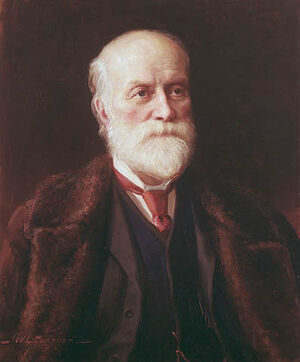Sandford Fleming (nonfiction): Difference between revisions
(Created page with "thumb|Sandford Fleming.'''Sir Sandford Fleming''', KCMG (January 7, 1827 – July 22, 1915) was a Scottish Canadian engineer and inventor. B...") |
No edit summary |
||
| Line 3: | Line 3: | ||
Born and raised in Scotland, he emigrated to colonial Canada at the age of 18. He proposed worldwide standard time zones, designed Canada's first postage stamp, left a huge body of surveying and map making, engineered much of the Intercolonial Railway and the Canadian Pacific Railway, and was a founding member of the Royal Society of Canada and founder of the Canadian Institute, a science organization in Toronto. | Born and raised in Scotland, he emigrated to colonial Canada at the age of 18. He proposed worldwide standard time zones, designed Canada's first postage stamp, left a huge body of surveying and map making, engineered much of the Intercolonial Railway and the Canadian Pacific Railway, and was a founding member of the Royal Society of Canada and founder of the Canadian Institute, a science organization in Toronto. | ||
In 1849 he created the Royal Canadian Institute with several friends, which was | In 1849 he created the Royal Canadian Institute with several friends, which was granted a royal charter on November 4, 1851, in which the objects of the society are declared to be "the encouragement and general advancement of the physical sciences, the arts and the manufactures." | ||
Fleming served in the 10th Battalion Volunteer Rifles of Canada (later known as the Royal Regiment of Canada) and was appointed to the rank of Captain on January 1, 1862. He retired from the militia in 1865. | Fleming served in the 10th Battalion Volunteer Rifles of Canada (later known as the Royal Regiment of Canada) and was appointed to the rank of Captain on January 1, 1862. He retired from the militia in 1865. | ||
Revision as of 15:55, 28 January 2017
Sir Sandford Fleming, KCMG (January 7, 1827 – July 22, 1915) was a Scottish Canadian engineer and inventor.
Born and raised in Scotland, he emigrated to colonial Canada at the age of 18. He proposed worldwide standard time zones, designed Canada's first postage stamp, left a huge body of surveying and map making, engineered much of the Intercolonial Railway and the Canadian Pacific Railway, and was a founding member of the Royal Society of Canada and founder of the Canadian Institute, a science organization in Toronto.
In 1849 he created the Royal Canadian Institute with several friends, which was granted a royal charter on November 4, 1851, in which the objects of the society are declared to be "the encouragement and general advancement of the physical sciences, the arts and the manufactures."
Fleming served in the 10th Battalion Volunteer Rifles of Canada (later known as the Royal Regiment of Canada) and was appointed to the rank of Captain on January 1, 1862. He retired from the militia in 1865.
Inventor of worldwide standard time: After missing a train in 1876 in Ireland because its printed schedule listed p.m. instead of a.m., he proposed a single 24-hour clock for the entire world, located at the centre of the Earth, not linked to any surface meridian. At a meeting of the Canadian Institute in Toronto on February 8, 1879, he linked it to the anti-meridian of Greenwich (now 180°). He suggested that standard time zones could be used locally, but they were subordinate to his single world time, which he called Cosmic Time. He continued to promote his system at major international conferences including the International Meridian Conference of 1884. That conference accepted a different version of Universal Time but refused to accept his zones, stating that they were a local issue outside its purview. Nevertheless, by 1929, all major countries in the world had accepted time zones.
In the News
Fiction cross-reference
Nonfiction cross-reference
External links:
- Sandford Fleming @ Wikipedia
Attribution:
